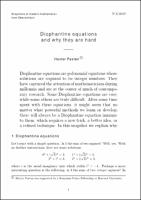| dc.contributor.author | Pasten, Hector | |
| dc.contributor.editor | Randecker, Anja | |
| dc.contributor.editor | Jahns, Sophia | |
| dc.date.accessioned | 2019-04-24T09:52:05Z | |
| dc.date.available | 2019-04-25T09:52:05Z | |
| dc.date.issued | 2019-04-24 | |
| dc.identifier.uri | http://publications.mfo.de/handle/mfo/1413 | |
| dc.description.abstract | Diophantine equations are polynomial equations whose
solutions are required to be integer numbers. They
have captured the attention of mathematicians during
millennia and are at the center of much of contemporary
research. Some Diophantine equations are easy,
while some others are truly difficult. After some time
spent with these equations, it might seem that no
matter what powerful methods we learn or develop,
there will always be a Diophantine equation immune
to them, which requires a new trick, a better idea, or
a refined technique. In this snapshot we explain why. | en_US |
| dc.language.iso | en | en_US |
| dc.publisher | Mathematisches Forschungsinstitut Oberwolfach | en_US |
| dc.relation.ispartofseries | Snapshots of modern mathematics from Oberwolfach;2019,03 | |
| dc.rights | Attribution-ShareAlike 4.0 International | * |
| dc.rights.uri | http://creativecommons.org/licenses/by-sa/4.0/ | * |
| dc.title | Diophantine equations and why they are hard | en_US |
| dc.type | Article | en_US |
| dc.identifier.doi | 10.14760/SNAP-2019-003-EN | |
| local.series.id | SNAP-2019-003-EN | en_US |
| local.subject.snapshot | Algebra and Number Theory | en_US |
| dc.identifier.urn | urn:nbn:de:101:1-2019051609463306392545 | |
| dc.identifier.ppn | 1665804130 | |


